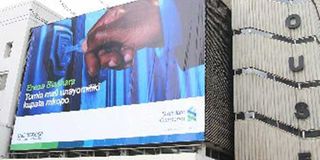Islamic products the next battle front for banks

Standard Chartered Bank is expected to unveil its Islamic banking window, becoming the latest local financial institution to join the rush for control of the growing segment that is hoped to help deepen financial reach in the country. PHOTO/FILE
What you need to know:
- Standard Chartered Bank is expected to unveil its Islamic banking window, becoming the latest local financial institution to join the rush for control of the growing segment that is hoped to help deepen financial reach in the country.
- StanChart an KCB are following in the footsteps of the National Bank, which, last year, launched its Islamic banking platform, promising to create a fully-fledged subsidiary in future.
Commercial banks are restructuring their growth strategies to focus more on the fast-growing Islamic banking business as they target bigger customer numbers and more revenues.
Though still regarded a nascent concept in Kenya’s banking industry, shariah-complaint products have slowly gained popularity over the last few years and banks’ CEOs now have their gloves off to fight for a piece of the pie.
In the process, what was initially a preserve for two fully Islamic banks operating in Kenya — Gulf African Bank and First Community Bank — has now become a lucrative front for the financial sector with companies having to craft new tactics to drive growth in an increasingly competitive environment.
Standard Chartered Bank is expected to unveil its Islamic banking window, becoming the latest local financial institution to join the rush for control of the growing segment that is hoped to help deepen financial reach in the country.
A statement said the bank is hoping to replicate its 18-year experience in global Islamic banking in the Kenyan market to cater for a growing demand.
Dubbed Saadiq, the Stanchart’s Islamic financial services platform will be launched barely a week after rival KCB announced plans to roll out products targeted at the Islam community by July.
“We plan to launch five products in the first phase, which will be up and running by July this year and then later on, introduce more products in the fourth quarter of the year,” KCB Islamic Banking boss Jaafar Abdulkadir said last week.
The bank has already identified six centres for Islamic banking in the first phase to include KCB Mvita branch, KCB Mwembe Tayari branch, KCB Kilindini branch, KCB Garissa branch, KCB Wajir branch and KCB Eastleigh branch.
These areas have large concentrations of the Muslim community.
StanChart an KCB are following in the footsteps of the National Bank, which, last year, launched its Islamic banking platform, promising to create a fully-fledged subsidiary in future.
The platform, branded National Amanah, is targeted at retail, SME and corporate clients offering banking products and services in compliance with the Islamic Shariah laws.
“The launch of National Amanah is part of our strategy to provide our clients with greater choice and reach out to more unbanked Kenyans.
“We hope to open a wholly-owned subsidiary focusing on Islamic banking, with its own brand in the near future,” managing director Munir Ahmed said at the launch last April.
Barclays Bank was, however, the first in 2005 to open an Islamic banking unit in the country through its La Riba current account offering.
The unprecedented growth of Islamic banking in Kenya has seen the sector regulator come under pressure with players calling for more proactive efforts to open up financial services to the Islam community.
Last week, Central Bank of Kenya governor Njuguna Ndung’u said the government is keen on fostering the development of Shariah-compliant banking products and services.





